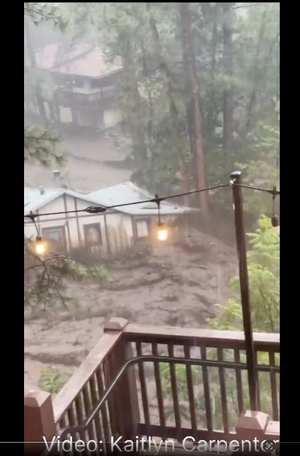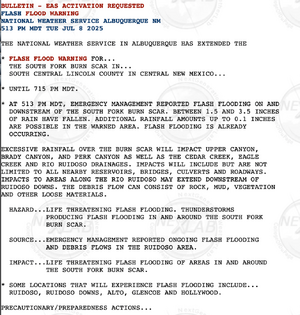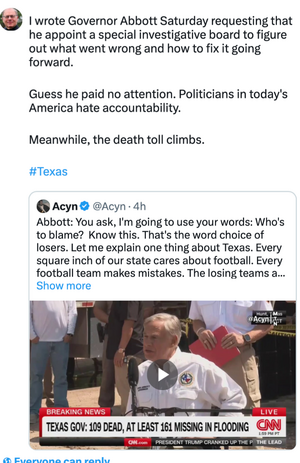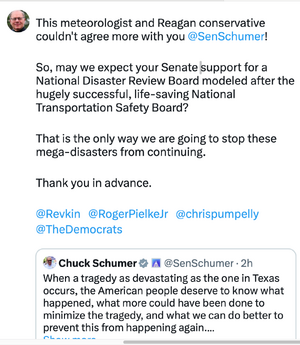Randy Zipser
EF4
While a lot of attention in this horrific, deadly flood disaster has been focused on the National Weather Service offices (SJT, SAT).
What about the State of Texas resources? The Texas Water Development Board (TWBD) is the agency designated by Texas state law as the state National Flood Insurance Program (NFIP) coordinating agency (counterpart to the OWRB in Oklahoma). If Texas operates their flood program anything like Oklahoma has been doing for years after my time there, the TWBD should be offering outreach services to afflicted residents, particularly now in these crucial post-recovery days following the disaster rescue efforts. The flood-program pages on their website are at the following link: Texas Water Development Board.
For a flood disaster of this magnitude (the Guadalupe River Basin is extremely flood-prone based upon several similar past events), it is entirely predictable (yet still somewhat concerning) that state flood program resources may not be able to handle adequately the post-recovery response without additional federal assistance (FEMA, National Guard, etc.) or similar emergency-response personnel brought in from other states (Florida is one state whose governor has already offered such help). The NFIP personnel will be on-site handling property damage claims, but these field-adjusters usually will not be involved with matters outside the purview of NFIP assistance regulations. And, then there's DOGE's efforts earlier this year to transfer FEMA's current functions to the states as part of the current administration's efforts to reduce the federal deficit (which is not going to happen anyway with the budget bill just passed!). It's just one big mess and a sad state of affairs: pointing-fingers and the "blame game" will get us nowhere fast!
That is why Mike's idea of a National Disaster Board is such a good idea, especially if this one entity will jump right in and quickly assess whatever assistance is needed immediately after the event and issue recommendations for coordination of all available assets, whether federal, state, private, or military.
The federal government doesn't want to handle major natural disasters and the states' emergency-program resources will likely be quickly overwhelmed, so a NDRB would be the answer. But, is anybody in Washington listening? Will it take a Cat 5 hurricane plowing through Houston, New Orleans, Tampa, or Miami to stir Washington to take action? Do like I did and keep bugging your Congressman or Congresswoman to take action and find some funds in the bill just passed and get this thing going!
What about the State of Texas resources? The Texas Water Development Board (TWBD) is the agency designated by Texas state law as the state National Flood Insurance Program (NFIP) coordinating agency (counterpart to the OWRB in Oklahoma). If Texas operates their flood program anything like Oklahoma has been doing for years after my time there, the TWBD should be offering outreach services to afflicted residents, particularly now in these crucial post-recovery days following the disaster rescue efforts. The flood-program pages on their website are at the following link: Texas Water Development Board.
For a flood disaster of this magnitude (the Guadalupe River Basin is extremely flood-prone based upon several similar past events), it is entirely predictable (yet still somewhat concerning) that state flood program resources may not be able to handle adequately the post-recovery response without additional federal assistance (FEMA, National Guard, etc.) or similar emergency-response personnel brought in from other states (Florida is one state whose governor has already offered such help). The NFIP personnel will be on-site handling property damage claims, but these field-adjusters usually will not be involved with matters outside the purview of NFIP assistance regulations. And, then there's DOGE's efforts earlier this year to transfer FEMA's current functions to the states as part of the current administration's efforts to reduce the federal deficit (which is not going to happen anyway with the budget bill just passed!). It's just one big mess and a sad state of affairs: pointing-fingers and the "blame game" will get us nowhere fast!
That is why Mike's idea of a National Disaster Board is such a good idea, especially if this one entity will jump right in and quickly assess whatever assistance is needed immediately after the event and issue recommendations for coordination of all available assets, whether federal, state, private, or military.
The federal government doesn't want to handle major natural disasters and the states' emergency-program resources will likely be quickly overwhelmed, so a NDRB would be the answer. But, is anybody in Washington listening? Will it take a Cat 5 hurricane plowing through Houston, New Orleans, Tampa, or Miami to stir Washington to take action? Do like I did and keep bugging your Congressman or Congresswoman to take action and find some funds in the bill just passed and get this thing going!




